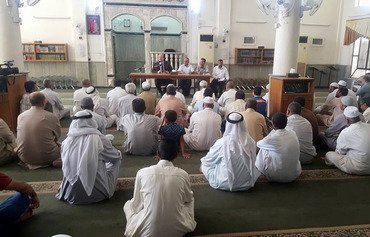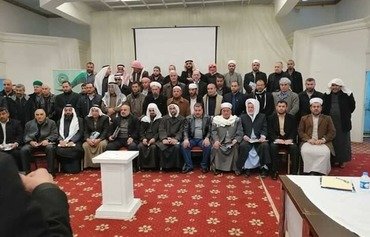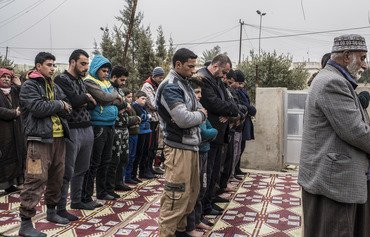Following the military defeat of the "Islamic State of Iraq and Syria" (ISIS), the Iraqi government is seeking to adopt a national strategy to confront extremism and cleanse the liberated areas from extremist and deviant ideology.
While the group was in control over large swaths of Iraq, it imposed a harsh code of conduct on civilians based on its extreme interpretations of sharia.
The group used these extreme interpretations to justify its crimes and violations, deceiving people by attempting to convince them of the veracity of its distorted version of Islam and punishing them when they failed to comply with its orders.
Efforts to dispel the group's influence must begin with dispelling its twisted ideology, which is far removed from the teachings of Islam, said Abu Bakr Kanaan, the head of the Sunni Endowment Authority in Ninawa province.
He stressed that this responsibility is to be shouldered by clerics, who should "direct all thinking in this regard towards the correct principles of the faith".
Kanaan told Diyaruna his office has been working towards this goal since the start of the year through various means.
These include "direct communication with people in mosques, as well as organising conferences and seminars that shed light on the deceptive nature of terrorists and their religious interpretations", he said.
"We also are working with the Ninawa Education Board to organise these types of activities in schools," he said, noting that this is important as children and adolescents have been a primary target of ISIS's brainwashing attempts.
The first things ISIS did when it imposed its control in the areas of Iraq it overran was to replace school curricula with content that incites violence and extremism and engage in the forceful recruitment of children, he said.
Counter-extremism efforts
To mitigate the social damage inflicted by ISIS, the Sunni Endowment in Ninawa has developed programmes that aim to counter the effects of terrorism in people’s minds and develop their knowledge-based skills, Kanaan said.
"We made all our clerical staff take courses to introduce them to the guidance issued by the Sunni Endowment Authority that promotes a moderate approach in religious discourse," he said.
"We also have a unified Friday sermon that is written every week by specialist religious committees and is given to preachers and imams at mosques to deliver to worshippers," he added.
In the event that these sermons are not delivered as specified, the preacher or imam has to submit a written pledge not to repeat the violation or will face being suspended from his job, Kanaan said.
Preachers and imams in Ninawa have been in compliance, however, he noted.
Rooting out the ISIS ideology requires "countermeasures that are both integrated and comprehensive", said Nuha Derwish, who teaches psychology and sociology at Baghdad University.
She told Diyaruna that "any strategy should account for all aspects of this issue and every national institution has to play a role in confronting extremism".
"We have to strengthen education and reinforce the role of the media and social media in raising awareness that opposes terrorism and to confront attempts to poison minds with a deviant vision," she said.
Reinforcing the rule of law
Derwish also stressed the need to help young people cultivate an open mind, and the importance of exposing them to a variety of cultures and identities so they can accept differences as a source of strength for society.
When developing a counter-extremism strategy, Hope Foundation head Hana Edward told Diyaruna, an important component will be providing support to people who have been affected by terrorism, "particularly women and children".
These people must be offered psychological counselling services and financial support, as well as other forms of assistance that will enable them to take an active role in building their communities, she said.
Trust must be regained in affected communities by reinforcing the rule of law and avoiding a situation where innocent people are placed behind bars merely on suspicion of being terrorists or due to family ties with terrorists.
Part of the solution should be a national reconciliation initiative, she suggested.
Civil society organisations and community leaders also should be involved in the effort to curb a retaliatory environment and to instead create a peaceful society that has no place for extremism and violence, she added.

![Preachers and imams from Ninawa province receive guidance on how to confront the extremist ideology of the 'Islamic State of Iraq and Syria' in a photo posted online on December 11th. [Photo courtesy of the Sunni Endowment Authority in Ninawa]](/cnmi_di/images/2017/12/22/10745-iraq-faces-extremism-600_384.jpg)






